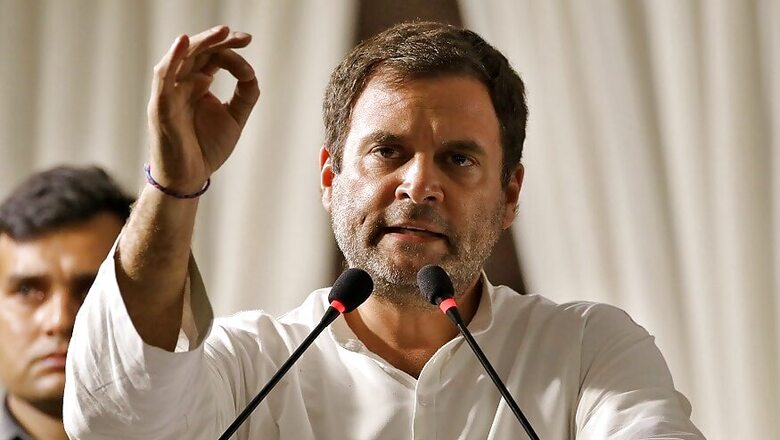
views
The former president of the Congress party is suddenly quite active again and it seems he is trying to accomplish something that he was unable to earlier. He had resigned from the party's top post last year following a drubbing in the general elections. These new efforts appear to be his exertion for regaining the throne. He has done some virtual press conferences and made some statements on the central government's preparation, or the lack of it, in handling the Covid-19 crisis. His supporters say that through a tweet in February, he had warned the government about the dangers of the novel coronavirus but it did not take his advice seriously.
Recently, he has started having virtual meetings with experts in various fields. First, he spoke with former Reserve Bank of India governor Raghuram Rajan. Then he had a conversation with Nobel laureate Abhijit Banerjee. Thereafter, he also chatted with public health experts Professor Ashish Jha from Harvard University and Professor Johan Giesecke of the Karolinska Institute in Sweden. Next in line was industrialist Rajiv Bajaj. And on June 12, the Congress leader invited university professor and former American diplomat Nicholas Burns.
This conversation between Burns and Gandhi was wider in a sense as they discussed the issues of tolerance, the political atmosphere of the United States and India, the post-Covid world order, the role of the Indian diaspora, the role of USA in international cooperation, the differences between authoritarian and democratic governments.
First, we need to understand the rationale behind Rahul Gandhi having these conversations. We all know that after assuming the Congress president's post, he presented himself as a leader who listens to and consults everyone. He was trying to portray an image in contrast to Prime Minister Narendra Modi's whom he was repeatedly blaming for not listening to anyone. Now, again he is bringing the same issues to the forefront, that he is open to ideas but the Bharatiya Janata Party leadership does not listen to anyone. There is no doubt that the BJP has its own explanations. But this is the strategy on which Rahul Gandhi has been working since the government's demonetisation move.
The second thing which we need to understand is how this strategy has worked so far. It hasn't. The BJP was successful in creating an image of a non-serious politician for Rahul even before he assumed the Congress presidentship. Some of his biggest political investments have gone wrong in a big way like the Rafale corruption narrative. His decisions on the appointment of chief ministers from his party, which came after much discussions, have not worked well. This gives the message that even if he is taking decisions after consultation, they have failed to favour his party.
In a time of crisis like Covid-19, his focus should have been on presenting a reliable governance model in the states where the Congress is in power with or without alliances. But instead of that, he is more concerned about highlighting the flaws of the government. He has not even acknowledged the role of his party in the Maharashtra government, the state that has been worst-hit by the pandemic.
Now let's analyse some of the prominent points from his conversation with Nicholas Burns. During the chat, he equated racial discrimination in the USA with religious discrimination in India. On all parameters, this is a wrong comparison. Burns, while criticising the policies of President Donald Trump, was defending the democratic institutions of India, but Gandhi could not do the same.
The Congress leader was trying to understand from Burns why the relationship between the US and India is more on a give-and-take basis instead of larger cooperation based on universal values. The question should be understood in terms of its formulation. He should have understood that these attitudes do not work anymore in international relations. His party has faced it many times. The relationship between two countries cannot be based on mere political philosophies. Philosophy can be a talking point but, in the 21st century, you need to have shared economic ties to keep your relationship alive.
Burns accepted that the US has ideological ties with China and discussed it at length. However, Rahul Gandhi failed to address anything on this issue and only responded that he does not want violence but cooperation. The interesting part is that at the end of the talk, Burns expressed how challenging it was to enforce and follow social distancing norms in the USA and motivate the youth to wear masks at public places. He also admired that India is following these norms in a better way, but Gandhi failed to acknowledge that.
In conclusion, Rahul Gandhi has to come out of this notion that he is a person who does not have any accountability to the nation. He is an MP from the Congress party and its former president as well. He wants to use the identities of a Congress leader and a common man at the same time which he can not. With all his failures, he is still the most reliable opposition face of the current political system. He needs to understand that his actions and thoughts are crucial as they represent the principal political opposition of India. If he declares the president of USA as authoritarian, he needs to understand that it will reflect on India-US relations in future.
In this renewed attempt, which is more on the digital platform, he is trying to present himself as a leader who is attempting to find answers to problems with experts who are acknowledged by Indian intellectuals. There is no doubt that this is a good attempt to portray himself as a person who is trying to understand challenges, but the issue is that he is not in academia nor is he working with a think tank. He is a politician and people are expecting a political alternative from him.
Rahul Gandhi needs to talk politically and should take political questions directly. He is not working in the media or academia. If he is interested in politics, he should start a political conversation in India. These digital conversations and consultations are good for his understanding but, by having them on a public platform, he is not doing any favours either to his guest or himself. His voters are suffering daily hardships, they have barely any time to watch these videos. He needs to understand that people who are appreciating his efforts are few in number and cannot help him regain the throne.
(The author is director of Center of Policy Research and Governance and tweets from @RamanandDelhi. Views expressed are personal.)




















Comments
0 comment